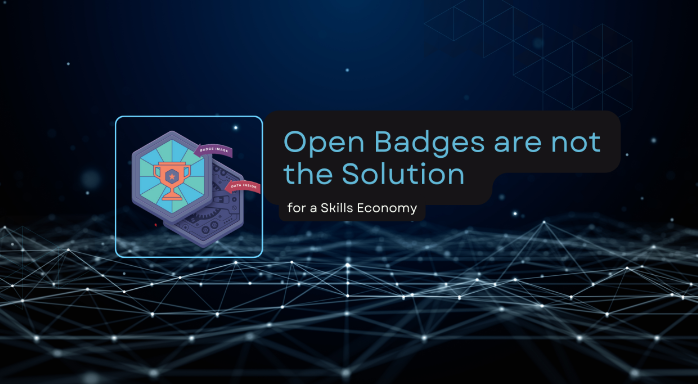

In recent years, there has been an increasing interest in open badges as a tool for representing and recognizing skills and achievements. Open badges are digital credentials that contain information about the issuer, the recipient, the criteria for earning the badge, and the evidence that supports the claim. However, despite their popularity, open badges have significant limitations that make them unsuitable for building a robust and effective skills economy.
Firstly, open badges lack the analytical capability required to assess and measure the specific skills or competencies demonstrated by the badge holder. Open badges often use simplistic and generic categories such as “communication” or “leadership,” which fail to capture the nuances and complexities of the skill being recognized. This can result in a lack of clarity around what the badge represents and its true value in the labour market.
Moreover, open badges lack rigor in their issuance, which can undermine their credibility and value. The current system allows anyone to create and issue badges, regardless of their expertise or experience. This means that the quality and consistency of the badges are not assured, and there is no guarantee that they represent a meaningful and accurate assessment of the skills or competencies demonstrated. There is the veneer of assurance through the endorsement process, however under the bonnet this has little substance and is typically a reciprocal arrangement of endorsement and is easily circumvented.
Some may point out that Open Badge standards has the capability to link to evidence of attainment and therefore can be interpreted as true statements of achievement or skills. However, in reality these are typically referrals to performance criteria and not a portfolio of evidence. Even if linked to a portfolio of evidence, this still requires manual verification and therefore mitigates most of the benefits sought through their usage.
In contrast, embedding quality assured rich skill descriptors into the issuance of credentials provides a more rigorous and robust approach to recognizing and measuring skills. Skill descriptors are specific statements that describe the knowledge, skills, and behaviours required for a particular job or task in a universal machine readable standard. They provide a detailed and standardized way of assessing and measuring skills, which is essential for creating a reliable and effective skills economy.
Furthermore, embedding skill descriptors into credentials allows for more granular and detailed assessments of skills, enabling employers to better match candidates to specific job requirements. This helps to reduce skill mismatches and improve the efficiency of the labour market, resulting in better outcomes for both employers and employees.
In conclusion, while open badges have their uses, they are not a suitable basis for a skills economy due to their limitations in analytical capability and lack of rigor in their issuance. Instead, embedding quality assured rich skill descriptors into credentials provides a more robust and reliable approach to recognizing and measuring skills. By doing so, we can build a skills economy that better serves the needs of employers, employees, and the knowledge economy as a whole.

